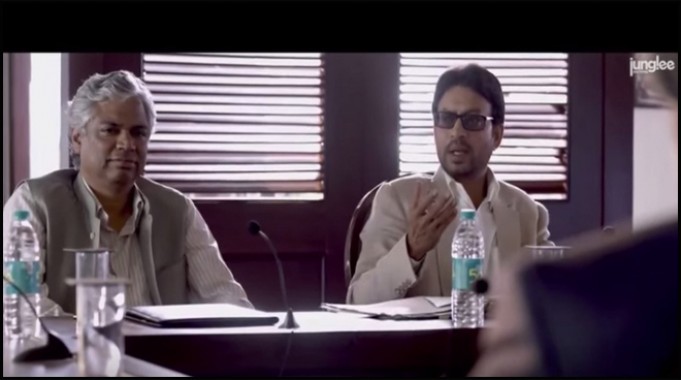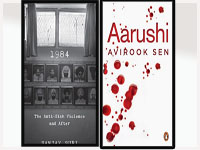Talvar: ‘Why we made it this way’
When Talvar releases in theatres on Friday it will put forth one more set of perceptions on whether justice was done in the Aarushi Talwar case. It comes on the heels of Aarushi, a book about the double murder which was both graphic and chilling in describing the miscarriage of justice that may have taken place.
This is a story that does not cease to trouble our conscience. This week, Justice A. P. Shah, in a long interview to the Times of India uses strong words about the media trial which he believes occurred and affected the rights of the parents in the actual trial.
Talvar is a long, grim, disturbing film, more journalistic than cinematic in its objective. In the words of its director Meghna Gulzar, it is a film about evidence not collected.
It merits examining outside the framework of commercial cinema because it eschews several of its temptations. There was much melodrama on offer in the material at hand with the police who handled the case indulging in cheap sensationalism. All of that has been dealt with, but not overplayed.
And the focus does return each time to evidence not collected because the focus of the film is the three investigations that took place: one by the police and two by the CBI under two successive CBI directors. One retired, a second one took over, and the findings were turned on their head.
There was also the dramatic and pillorying role of the media, enacting shrill piece-to-cameras from neighbouring rooftops while the double murders were being investigated. But the media is not a player in this film. It is cast only in a ritual role, a chorus, like Macbeth’s witches, that marks out stages in the case as it unfolded.
At a screening of Talvar organized by Catch News, those who made the film talked about what spurred this venture. Gulzar said she was drawn to the project when the story kept changing. She thought there were questions which needed answers, and there was a closure that was lacking. She also decided, she says, that the film needed to be neutral and that she needed to be objective. “That got difficult” she admits but nevertheless this is a film which plays out different versions of what might have happened, even as it documents all the investigative stages and recreates an important meeting which film maker Vishal Bhardwaj, who wrote the script, insists took place. The two CBI teams are brought together by a Home Ministry official to confront the two very different sets of evidence.
Bhardwaj suggests that he brought journalistic veracity to this part of the script, drawing its details out from the officers who were present there, interviewing them. “We wanted to be very fair to all the investigating teams. The last meeting [shown in the film] is based on our meetings with them. Nothing that we have added is from our own side.”
His interest in the story was triggered by a chance meeting with one of the investigation officers. How come two murders took place and the parents heard nothing, he wanted to know. The officer told him that they had done audio tests and concluded that indeed nothing could be heard from inside the bedroom of what was happening outside. He said that, for him, there were amusing, bizarre, and disturbing things that kept coming out of this tragedy. “And I am a great fan of Rashomon,” he said. So he decided to draw inspiration from the Kurosawa film in telling a tale that had more than one version of the truth.
The film makers seem to have wanted their fiction to be faithful to the facts. In the conversation with Shoma Choudhury, editor-in-chief of Catch News, which followed the screening, Bhardwaj was asked what had been left out of the film. He replied that the investigators they met had narrated some very painful things but he did not include those in the script because their veracity could not be confirmed. You have to smile at the irony of a movie maker saying ‘I could not include things whose veracity I could not confirm’. In a film which is, in the final analysis, a fictional take.
The film is held together by actor Irrfan Khan who plays the CBI inspector brought in six months later to sift through all the bungled evidence and make sense of it. He is cynical, then scathing, and then anguished by the botching up the police have managed to do.
The other strong performance is by Rajesh Talwar’s clinic employee Krishna. The scenes which feature him suggest that all the leads the police claimed to come up with in the course of the investigation emanated from him. This becomes the director and script writer’s call. No hesitation here about not using angles that could not be confirmed.
Both Khan and Bhardwaj make the point that what drew them to tackling a film on this messed up case was the horror of what it tells you about the system. ‘It was a very painful journey and it scares me to think that if some day anyone can get sucked into the system that we have, what can happen,” Bhardwaj said. He then wrote a script compelling enough to draw in the actors.
Said Khan, “We already had a perception but the script had shocking revelations which pulled me in. It was so true, so near, and so frightening. Tragic incidents give us a chance to look at our system. The different departments, how we deal with crisis.”
He then offered a disarming analysis of what this case meant for the officer he was playing, as well as what the role meant for him at this stage in his career.
About the officer: “I saw him as if his career was at a level where he wanted to do other things - move onto much more important or interesting cases. Your job makes you what you are. He has capability and talent and sincerity. Maybe he wanted to evolve as an investigator. He knows he won’t find much. He is going in there after six months, what will he find? It is already late. He was almost cynical about his department. When they get on the scene they are already late. So there was a kind of cynicism.”
But, Khan adds, when the officer finds that it is his responsibility to find the answer, he decides to get on with the job. But once he is sucked in, he feels the same pain again.
And about himself: “I want to share this so that you know. When you are living in a society, you know you keep on reflecting on things, you keep on seeing those things . If you choose not to slide issues under the carpet, it lives in you and it creates some kind of reaction inside you and it keeps penting up. When you get a story that allows you to share that anguish, then you don’t care about other things.
‘Like when I chose this film, I knew it was not taking my career anywhere and I knew I was not getting much money from Priti (the producer)! I did it just because of this anguish I felt which the story was giving me an opportunity to share with you.”
In short, director, scriptwriter, actor all suggest that this wasn’t just another cinematic venture.
What you get in the film, then, is a thinly fictionalized documentation of what the police and the CBI are capable of when they investigate. Comical yes, but hardly funny when you know that this is a true portrait, and also very scary, as both Khan and Bhardwaj point out.
The trial is not touched because it was going on while the movie was being made and the matter was sub-judice, though the material which came up during it is used. Bhardwaj said he did not want to take on the judiciary. “I want to make more films in life.”








